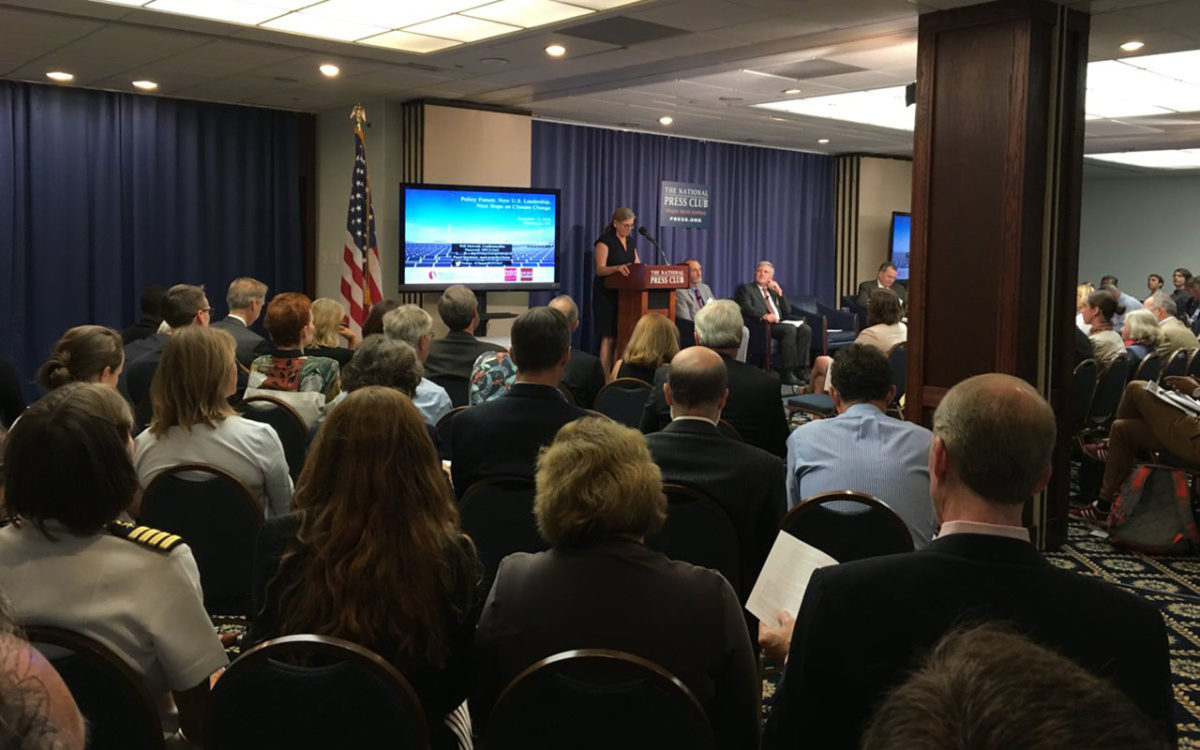Reframing Climate Change as a Public Health Threat
Policy experts gathered this week at the National Press Club in Washington, D.C. to discuss how the next administration should tackle climate change. On offer were the usual recommendations for investing in clean energy and developing market-based approaches for reducing emissions, but experts from Stanford University’s School of Medicine urged officials to consider climate change’s impact on human health — and to use those looming impacts as a means of rallying much-needed action.

Policy experts talked climate change at the National Press Club Thursday.
Visual: Georgetown Climate Center
“The climate change dialogue is really important, but it can be very hard for Americans to connect with emissions reductions and carbon taxes,” said Katherine Burke, deputy director of Stanford University’s Center for Innovation in Global Health, who joined a panel discussion on Adaptation, Carbon Sequestration, and Public Health. “I really think that health can put a human face on climate change and can engage our leaders and the public in a much more personal way.”
The event in Washington coincides with publication of new report from Burke and her colleagues at Stanford, which emphasizes both the looming impacts of a warming planet on public heath, and the potential for public health to bridge entrenched political and social differences. From that report:
The health sector has a major role to play in reframing the problem. Making health a central focus of all climate change policies, programs and planning can shift attention to widely-shared concerns and values. The administration must use all its tools – appointments, directed funding, convening power and, most of all, presidential leadership – to heighten public awareness, facilitate interagency and international cooperation, engage all stakeholders, and press for urgent and effective action to anticipate and address the health risks associated with a warming planet.
The report further urges the next administration to take several measures to offset the health costs of global warming. These include encouraging hospitals and healthcare workers to prepare themselves — and their patients — for “the shocks of climate change,” and drafting a climate response plan modeled after the Presidential Emergency Plan for AIDS Relief. The report also calls for improving surveillance of food- and waterborne diseases — both likely to be exacerbated by a warming planet — and investing in technology and services that mitigate climate change while improving public health, like energy-efficient urban planning that reduces air pollution.
To be sure, disease, food and water insecurity, along with air pollution, are all being made worse by climate change, experts say, and that will likely become very expensive if officials don’t start making plans to deal with them.
A 2011 study, for example, estimated that six recent climate change-related events in the U.S. resulted in thousands of early deaths and hospitalizations, with health costs that exceeded $14 billion. And a report published last year by the Lancet Commission on Health and Climate Change concluded that “climate change is the biggest global health threat of the 21st century,” and that health professionals have a unique role to play, both in spearheading local responses to the crisis, and pushing governments at the local, state, and federal levels to develop policies to mitigate planet-warming pollution.
From that 2015 report:
Health professionals have worked to protect against health threats, such as tobacco, HIV/AIDS, and polio, and have often confronted powerful entrenched interests in doing so. Likewise, they must be leaders in responding to the health threat of climate change. A public health perspective has the potential to unite all actors behind a common cause—the health and wellbeing of our families, communities, and countries. These concepts are far more tangible and visceral than tonnes of atmospheric CO2, and are understood and prioritized across all populations irrespective of culture or development status.
In this light, it’s not all doom and gloom, according to Nick Watts, director of the U.K. Health Alliance on Climate Change and lead author of the 2015 Lancet Commission. Watts also sees the climate challenge as a doorway to collaboration — particularly given the very real economic and public health impacts of doing nothing. He is currently working with universities around the world to track a series of indicators, from tallying the health impacts of floods to measuring the atmospheric impacts of shutting down coal-fired power plants.
“We’re tracking a shift from a world that understands climate change as a problem, to thinking about the response to climate change as an opportunity,” said Watts. “The health benefits and cost savings are there, they’re real.
“The more we can aggregate that together,” he added, “it becomes a more convincing argument.”











Comments are automatically closed one year after article publication. Archived comments are below.
We better start caring about our planet and the first thing that should happen is end globalization and the dominance of corporations.